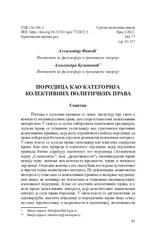Приказ основних података о документу
Porodica kao kategorija kolektivnih i političkih prava
| dc.creator | Bulatović, Aleksandra | |
| dc.creator | Fatić, Aleksandar | |
| dc.date.accessioned | 2022-10-26T07:50:26Z | |
| dc.date.available | 2022-10-26T07:50:26Z | |
| dc.date.issued | 2022 | |
| dc.identifier.issn | 0354-5989 | |
| dc.identifier.uri | http://rifdt.instifdt.bg.ac.rs/123456789/2686 | |
| dc.description.abstract | Pitanja o ljudskim pravima se danas diskutuju pre svega u kontekstu individualnih prava, kao suprotstavljenih kolektivnim interesima. U skladu sa dugom liberalnom političkom tradicijom, ljudska prava se uglavnom sagledavaju kao suštinski protivna kolektivnim pravima, koja mogu ograničiti slobodu pojedinca da pravi izbore koji bi mogli ugroziti relevantne kolektivne interese. U ovom tekstu se ljudska prava sagledavaju kao izvedena socijalna prava. Kao što priroda i identitet zajednice kojoj pojedican pripada bitno određuju identitet tog pojedinca (Agambenov pojam „Socialitas“, ili „društvenosti“), individualna prava nemaju puno značenje van konteksta vrednosti, prava i interesa zajednice. Opisani kontekst tek omogućava postojanje autentičnog i čvrstog pojma nacionalnog interesa. Po definiciji, nacionalni interesi su povezani sa kolektivnim pravima i vizijama zajednice; oni nikad ne počivaju na pogledima i stavovima individualnog, izolovanog pojedinca. Jedno od ključnih kolektivnih prava, i u isto vreme kolektivnih interesa, koje konstituiše nacionalni interes je skup prava porodice. U ovom tekstu se argumentiše da odgovarajuća zaštita porodice i porodičnih prava baca senku na samu pretpostavku o moralnosti i političkoj legitimnosti različitih savremenih ideologija, uključujući i feminističku ideologiju, koje sugerišu da, umesto da se štite prava i interesi porodice kao primarni nacionalni interes, država treba da štiti pojedince od porodice. Ideologije koje porodicu predstavljaju kao toksičnu, kao izvor pretnje individualnoj dobrobiti, u stvari su antisocijalne, totalitarne ideologije. Najveći broj argumenata koje takve ideologije iznose protiv porodice u stvari se sa jednakom snagom mogu primeniti protiv socijalnosti bilo kog tipa. Stoga u ovom tekstu argumentišemo da se Agambenov „moralni imperativ“ da svaki pojedinac doprinosi, na načine koji su mu na raspolaganju, soijalnosti njegovog društva, odnosi na odgovarajuće razumevanje porodice i treba da se shvati kao sama osnova anti-totalitarnog mišljenja. | sr |
| dc.description.abstract | Issues of human rights are prevalently discussed as pertaining to individual rights as opposed to collective interests. Following the long liberal political tradition, human rights tend to be seen as potentially in opposition to collective rights, which may limit the liberty of the individual to make choices that would militate against the relevant collective interests. In this paper, we argue that individual rights ought to be seen as derivative, social rights. Just as an individual’s identity is markedly determined by the nature and identity of the community one belongs to (Agamben’s concept of ‘Socialitas’ or sociality), individual rights have little meaning outside the context of values, rights and entitlements of one’s community. This is a context that gives rise to the concept of national interest. By definition, national interests are associated with collective rights, entitlements and visions; they are never associated with the views and positions of a single, discrete individual. One of the key collective rights that constitutes national interest is the set of rights of the family. We argue that protecting the family and family rights casts a shadow on the very morality and political legitimacy of the various ideologies of today, including that of feminism, which suggest that, rather than protecting family rights and interests as a primary national policy the state should protect individuals from the family. The ideologies which portray the family as toxic, as a source of threat to individual well-being, are in fact antisocial, totalitarian ideologies, as most of the arguments levied by such ideologies against the family can bear with equal force against Socialitas of any type, against sociality. We argue that Agamben’s ‘moral imperative’ for any individual to contribute, by whatever means one has at one’s disposal, to one’s sociality, applies to our understanding of the family and ought to be taken as a foundation of anti-totalitarian thinking. | sr |
| dc.language.iso | sr | sr |
| dc.publisher | Beograd: Institut za političke studije | sr |
| dc.relation | info:eu-repo/grantAgreement/MESTD/inst-2020/200025/RS// | sr |
| dc.rights | openAccess | sr |
| dc.rights.uri | https://creativecommons.org/licenses/by/4.0/ | |
| dc.source | Srpska politička misao | sr |
| dc.subject | porodica | sr |
| dc.subject | kolektivna prava | sr |
| dc.subject | ljudska prava | sr |
| dc.subject | nacionalni interes | sr |
| dc.subject | totalitarne ideologije | sr |
| dc.subject | the family | sr |
| dc.subject | collective rights | sr |
| dc.subject | human rights | sr |
| dc.subject | national interest | sr |
| dc.subject | totalitarian ideologies | sr |
| dc.title | Porodica kao kategorija kolektivnih i političkih prava | sr |
| dc.type | article | sr |
| dc.rights.license | BY | sr |
| dc.citation.issue | 3 | |
| dc.citation.volume | 77 | |
| dc.citation.spage | 93 | |
| dc.citation.epage | 117 | |
| dc.identifier.doi | 10.22182/spm.7732022.5 | |
| dc.type.version | publishedVersion | sr |
| dc.identifier.fulltext | http://rifdt.instifdt.bg.ac.rs/bitstream/id/9379/SPM-77-5(1).pdf |

